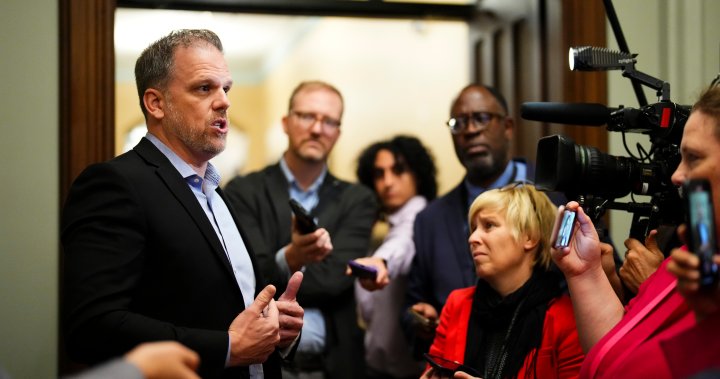Health Minister Mark Holland says he doesn’t think ultimatums are necessary as his NDP critic says the passage of single-payer pharamcare is a “red line” for the supply and confidence agreement keeping the Liberals in power.
“We have to make the decision based on reason and logic, what’s the best thing for our health system and what is possible in terms of the constraints we have fiscally,” Holland told reporters on his way into Tuesday morning’s cabinet meeting.
“So people can make ultimatums and draw lines, and all do all of those kinds of things, but you can’t lead from that place. You have to lead a place of what’s right to do.”
As part of the supply and confidence agreement between the Liberals and the NDP, the Liberals will advance some key NDP priorities in exchange for support on confidence votes in the minority Parliament until fall 2025, when another election must by law be held.
This includes passing legislation on pharmacare by the end of this year.
At their policy convention over the weekend, NDP delegates voted in favour of having this pharmacare provision be a make-or-break point in the supply and confidence agreement.
The agreement says the Liberals will introduce and pass the Canada Pharmacare Act by the end of 2023 and then task the National Drug Agency to develop a formulary of essential medicines and bulk purchasing plan by the end of the agreement, which runs to 2025.
“I think it was a crystal clear message to the government that we want public pharmacare and we expect the Liberals to deliver on the promise, and it’s going to be a red line for us,” NDP health critic Don Davies told reporters on his way into question period on Monday.
He added that the NDP sees this as essential because too many people in Canada can’t access prescription medication in an affordable way.
“Eight million Canadians right now, as we’re talking, don’t have access to pharmaceutical coverage. Millions more have some, but it’s deficient. Thousands of people die every year in a G7 country because they don’t get access to medication,” Davies said.

Currently, Conservatives are leading in the polls and projected to have a shot at forming a majority government, though a thin one, if an election were called today.
When asked if there’s a political risk of the NDP pulling support for the Liberals at this time, Davies stood firm.
“Sometimes you have to stand on principle, and this is a principle we’re fighting for,” Davies said.
“It was the NDP that forced the Liberals to bring in health care in the ’60s, and we’re going to force them to bring in pharmacare in the 2000s or expose them for the, frankly, the faux progressive that they are.”
The NDP previously rejected a first draft of pharmacare legislation put forward by the Liberals, saying it wants to get a national single-payer system for all Canadians.
At this point, Parliament is scheduled to rise on Dec. 15 and the government has not unveiled its pharmacare plan. The NDP tabled its own legislation in June in an attempt to push the government to act.
Holland says work is still underway.
“We’re having internal conversations about what is and what isn’t possible, and that’s about as much as I can share at this point,” Holland said.
Davies acknowledged that time is short to pass legislation by the end of the year, but said the NDP is willing to be patient on implementation and gradually expanding the formulary to eventually include all medications.
— with files from The Canadian Press.
© 2023 Global News, a division of Corus Entertainment Inc.



